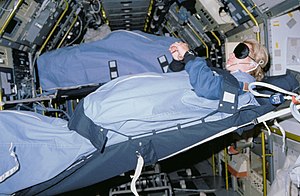
Sleeping in space is part of space medicine and mission planning, with impacts on the health, capabilities and morale of astronauts.
Human spaceflight often requires astronaut crews to endure long periods without rest. Studies have shown that lack of sleep can cause fatigue that leads to errors while performing critical tasks.[1][2][3] Also, individuals who are fatigued often cannot determine the degree of their impairment.[4] Astronauts and ground crews frequently suffer from the effects of sleep deprivation and circadian rhythm disruption. Fatigue due to sleep loss, sleep shifting and work overload could cause performance errors that put space flight participants at risk of compromising mission objectives as well as the health and safety of those on board.

- ^ Harrison, Y; Horne, JA (Jun 1998). "Sleep loss impairs short and novel language tasks having a prefrontal focus". Journal of Sleep Research. 7 (2): 95–100. doi:10.1046/j.1365-2869.1998.00104.x. PMID 9682180. S2CID 34980267.
- ^ Durmer, JS; Dinges, DF (Mar 2005). "Neurocognitive consequences of sleep deprivation" (PDF). Seminars in Neurology. 25 (1): 117–29. doi:10.1055/s-2005-867080. PMC 3564638. PMID 15798944.
- ^ Banks, S; Dinges, DF (15 August 2007). "Behavioral and physiological consequences of sleep restriction". Journal of Clinical Sleep Medicine. 3 (5): 519–28. doi:10.5664/jcsm.26918. PMC 1978335. PMID 17803017.
- ^ Whitmire, A.M.; Leveton, L.B; Barger, L.; Brainard, G.; Dinges, D.F.; Klerman, E.; Shea, C. "Risk of Performance Errors due to Sleep Loss, Circadian Desynchronization, Fatigue, and Work Overload" (PDF). Human Health and Performance Risks of Space Exploration Missions: Evidence reviewed by the NASA Human Research Program. p. 88. Retrieved 17 May 2012.